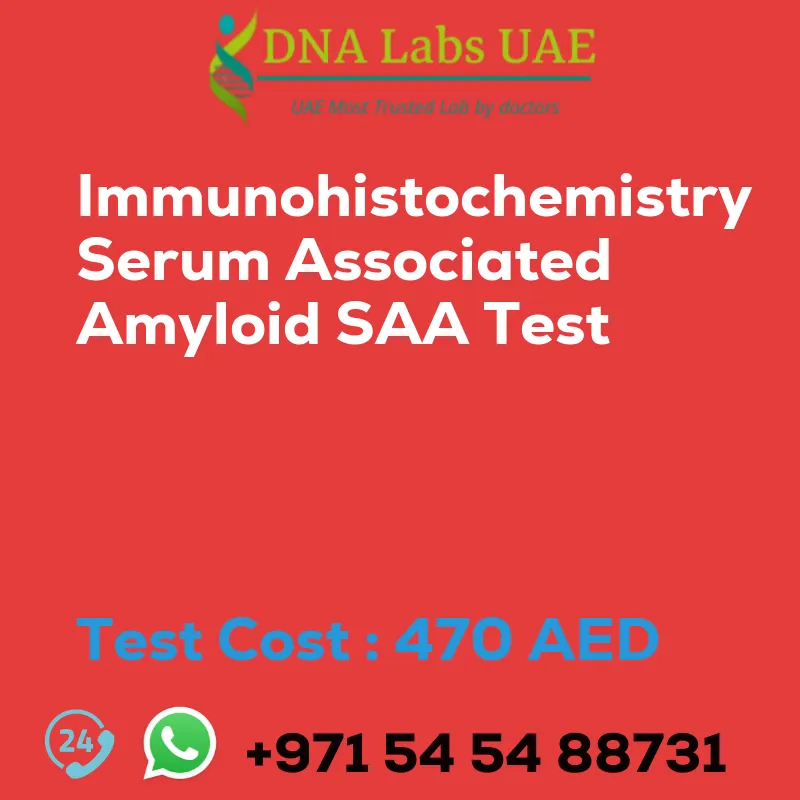IMMUNOHISTOCHEMISTRY SERUM ASSOCIATED AMYLOID SAA Test
Test Name: IMMUNOHISTOCHEMISTRY SERUM ASSOCIATED AMYLOID SAA Test
Components: Amyloidosis
Price: 470.0 AED
Sample Condition: Submit tumor tissue in 10% Formal-saline OR Formalin fixed paraffin embedded block. Ship at room temperature. Provide a copy of the Histopathology report, Site of biopsy and Clinical history.
Report Delivery: Sample Daily by 6 pm; Report Block: 5 days Tissue Biopsy: 5 days Tissue large complex: 7 days
Method: Immunohistochemistry
Doctor: Physician, Pathologist
Test Department: Pre Test Information
Test Details:
The immunohistochemistry serum associated amyloid (SAA) test is a diagnostic tool used to detect the presence of SAA protein in tissue samples. SAA is an acute-phase reactant protein that is produced by the liver in response to inflammation. Elevated levels of SAA in the blood can be indicative of various inflammatory conditions, including infections, autoimmune diseases, and certain types of cancer.
The immunohistochemistry SAA test involves staining tissue samples with specific antibodies that bind to the SAA protein. This staining technique allows for the visualization and identification of SAA deposits within the tissue. The test can be performed on various types of tissue samples, including biopsies or surgical specimens.
The immunohistochemistry SAA test is primarily used in the diagnosis and monitoring of amyloidosis, a group of disorders characterized by the abnormal accumulation of amyloid proteins in various organs and tissues. Amyloidosis can affect multiple organ systems and lead to organ dysfunction. By detecting the presence of SAA deposits, the test can help confirm the diagnosis of SAA amyloidosis and differentiate it from other types of amyloidosis.
In summary, the immunohistochemistry SAA test is a valuable tool for detecting SAA protein deposits in tissue samples, aiding in the diagnosis and monitoring of SAA amyloidosis and other inflammatory conditions.
| Test Name | IMMUNOHISTOCHEMISTRY SERUM ASSOCIATED AMYLOID SAA Test |
|---|---|
| Components | |
| Price | 470.0 AED |
| Sample Condition | Submit tumor tissue in 10% Formal-saline OR Formalin fixed paraffin embedded block. Ship at room temperature. Provide a copy of the Histopathology report, Site of biopsy and Clinical history. |
| Report Delivery | Sample Daily by 6 pm; Report Block: 5 days Tissue Biopsy: 5 days Tissue large complex : 7 days |
| Method | Immunohistochemistry |
| Test type | Amyloidosis |
| Doctor | Physician, Pathologist |
| Test Department: | |
| Pre Test Information | Provide a copy of the Histopathology report, Site of biopsy and Clinical history. |
| Test Details |
The immunohistochemistry serum associated amyloid (SAA) test is a diagnostic tool used to detect the presence of SAA protein in tissue samples. SAA is an acute-phase reactant protein that is produced by the liver in response to inflammation. Elevated levels of SAA in the blood can be indicative of various inflammatory conditions, including infections, autoimmune diseases, and certain types of cancer. The immunohistochemistry SAA test involves staining tissue samples with specific antibodies that bind to the SAA protein. This staining technique allows for the visualization and identification of SAA deposits within the tissue. The test can be performed on various types of tissue samples, including biopsies or surgical specimens. The immunohistochemistry SAA test is primarily used in the diagnosis and monitoring of amyloidosis, a group of disorders characterized by the abnormal accumulation of amyloid proteins in various organs and tissues. Amyloidosis can affect multiple organ systems and lead to organ dysfunction. By detecting the presence of SAA deposits, the test can help confirm the diagnosis of SAA amyloidosis and differentiate it from other types of amyloidosis. In summary, the immunohistochemistry SAA test is a valuable tool for detecting SAA protein deposits in tissue samples, aiding in the diagnosis and monitoring of SAA amyloidosis and other inflammatory conditions. |







